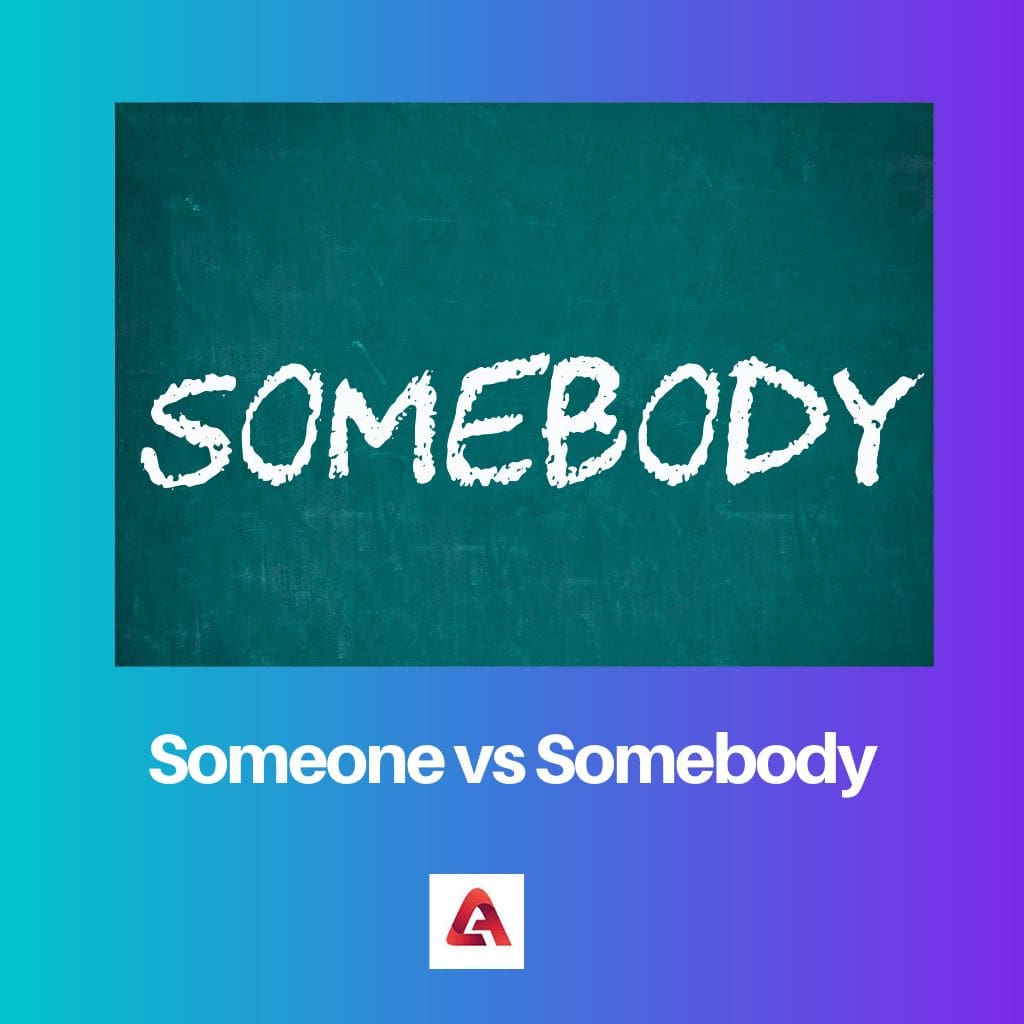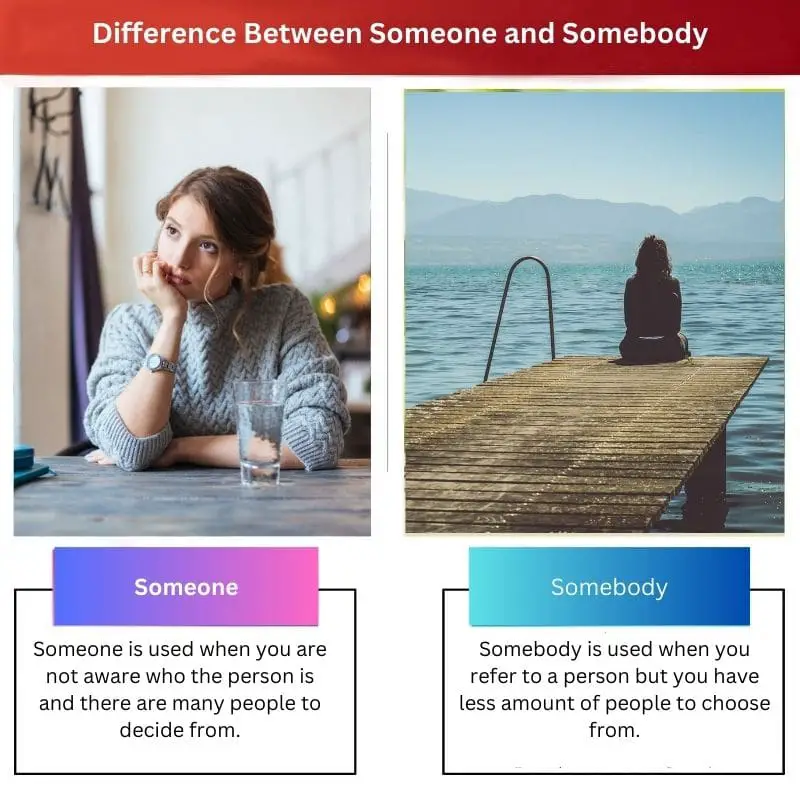“Someone” is a more general pronoun, used when the specific identity of a person is unknown or irrelevant. It conveys an unspecified individual. On the other hand, “somebody” implies a slightly more personal or specific reference to an individual, suggesting that they are of significance or importance in a given context.
Key Takeaways
- Someone and somebody both refers to an unspecified or unknown person.
- Someone is considered more formal than somebody and is used in more professional settings.
- Somebody is considered more casual than someone and is used in everyday conversations.
Someone vs. Somebody
“Someone” is an indefinite pronoun for an unknown person. It is used in place of a specific name or noun and can be used in various contexts, such as to ask for help, describe a person, or make a general statement. “Somebody” is a singular indefinite pronoun used to refer to an unspecified or unknown person.

The word Someone is considered more formal to use than the word Somebody just like the words everyone and everybody and the words anyone and anybody. The former words are considered to be more formal as compared to the latter words.
Comparison Table
| Feature | Someone | Somebody |
|---|---|---|
| Meaning | Refers to an unspecified or unknown person | Refers to an unspecified or unknown person |
| Part of speech | Pronoun | Pronoun |
| Formality | Slightly more formal | Slightly more informal |
| Usage | – “There’s someone at the door.” <br> – “I need to talk to someone about this issue.” | – “Somebody left their phone here.” <br> – “Do you think somebody will find this interesting?” |
What is Someone?
Someone is a pronoun used to refer to an unspecified person. It is commonly employed when the identity of the individual is either unknown or irrelevant to the context. This term is versatile and can be used in various situations where the speaker wants to refer to a person without specifying exactly who that person is.
Usage of Someone
- Indefinite Identity: When the speaker is discussing a person whose specific identity is not known or does not need to be disclosed, “someone” is used. For example: “Someone left their umbrella in the hallway.”
- General References: “Someone” is frequently used in general statements or questions where any person fitting the description would suffice. For instance: “Can someone please help me with this?” or “Someone needs to take charge of the situation.”
- Anonymity or Ambiguity: In contexts where anonymity or ambiguity is desired or appropriate, “someone” effectively communicates the idea without pinpointing a particular individual. For instance: “Someone once said that laughter is the best medicine.”
Examples of Someone in Context
- Casual Conversation: “I heard someone singing loudly in the park last night.”
- Request for Assistance: “Could someone please pass me the salt?”
- Anonymous Attribution: “Someone in the office has been leaving anonymous notes.”

What is Somebody?
Somebody is a pronoun used to refer to an unspecified person, similar to “someone.” However, it carries a slightly more personal or specific connotation. While still representing an individual whose identity may be unknown or irrelevant, “somebody” implies that this person holds significance or importance within a given context.
Usage of Somebody
- Personal Significance: “Somebody” is used when the speaker wishes to emphasize that the person being referred to holds importance or relevance. For example: “Somebody needs to take responsibility for the project.”
- Specificity: Although still indefinite, “somebody” suggests a more particular individual compared to “someone.” It can imply that the person being referred to is identifiable within a certain group or context.
- Informal or Friendly Tone: In some cases, “somebody” may convey a warmer or more familiar tone compared to “someone,” although the difference is subtle.
Examples of Somebody in Context
- Recognition of Importance: “There must be somebody in this company who can solve this problem.”
- Implication of Identity: “Somebody from the team is going to make a presentation at the conference.”
- Friendly Inquiry: “Is there somebody you’d like to invite to the party?”

Main Differences Between Someone and Somebody
- Specificity:
- “Someone” is more general, referring to an unspecified person without implying any particular significance.
- “Somebody” carries a slightly more personal or specific connotation, implying that the individual being referred to holds importance within a given context.
- Tone:
- While both terms are interchangeable, “somebody” may convey a slightly warmer or more familiar tone compared to “someone.”
- Usage:
- “Someone” is commonly used in various situations where the specific identity of the individual is unknown or irrelevant.
- “Somebody” is used when the speaker wishes to emphasize the importance or relevance of the person being referred to, albeit still unspecified. It can also imply a level of identifiability within a certain group or context.


While I appreciate the detailed comparison, it seems that the differences between ‘someone’ and ‘somebody’ are relatively subtle. Are they truly worth taking into account in everyday usage?
I do see your point, but I believe that knowing these subtle nuances can really elevate one’s writing and communication skills.
The playful rivalry between ‘someone’ and ‘somebody’ is akin to a rivalry of epic proportions! It’s fascinating how something so small can have such significance in our language.
Your humor is appreciated! It truly underscores the importance of understanding these seemingly small nuances.
I’m quite intrigued by the ways these words differ in tone. I’d never noticed these distinctions before, but this article has opened my eyes.
Right? I was also surprised by how much difference a single word can make in a sentence.
The comparisons and examples are clear and insightful, but I believe that the tone of this article is a bit too formal. A more conversational tone could engage readers better.
I see what you’re saying, but I think the formality is necessary to emphasize the differences.
I agree. The formality adds to the credibility of the information presented.
I had no idea these two words had such subtle differences. I believe this will definitely impact the way I write from now on.
Absolutely! You’ve expressed my thoughts exactly. This article was very enlightening.
Frankly, the distinctions between these words seem rather pointless to me. People use them interchangeably all the time without issue.
I understand your perspective, but precision in language is always beneficial.
I concur. There’s value in understanding the subtle nuances of our language.
This article was so informative and helpful for those of us learning the subtle nuances of English. I appreciate the in-depth analysis of ‘someone’ versus ‘somebody’ and how it impacts tone and formality in writing.
I found the examples and comparisons in this article very useful. I’ll be sure to share it with my peers.
I couldn’t agree more. The way you phrased that was also very elegant and formal. Thank you for your contribution!
I found the writing style of this article to be overly pedantic and needlessly formal. Surely, the differences between ‘someone’ and ‘somebody’ aren’t so deep as to warrant such a scholarly analysis.
I think the style is appropriate given the subject matter. These distinctions are crucial for formal writing.
You’re entitled to your opinion, but this kind of pedantry is what separates good writers from great writers.
I’ve never really pondered the distinctions between ‘someone’ and ‘somebody’, but this article has certainly made me reconsider the subtleties of our language.
It’s true. This article provides a depth of insight into seemingly simple words.
This article was quite enlightening regarding the differences between ‘someone’ and ‘somebody’, which I’d never fully grasped before.
Indeed, the article makes one appreciate the finer details of language.